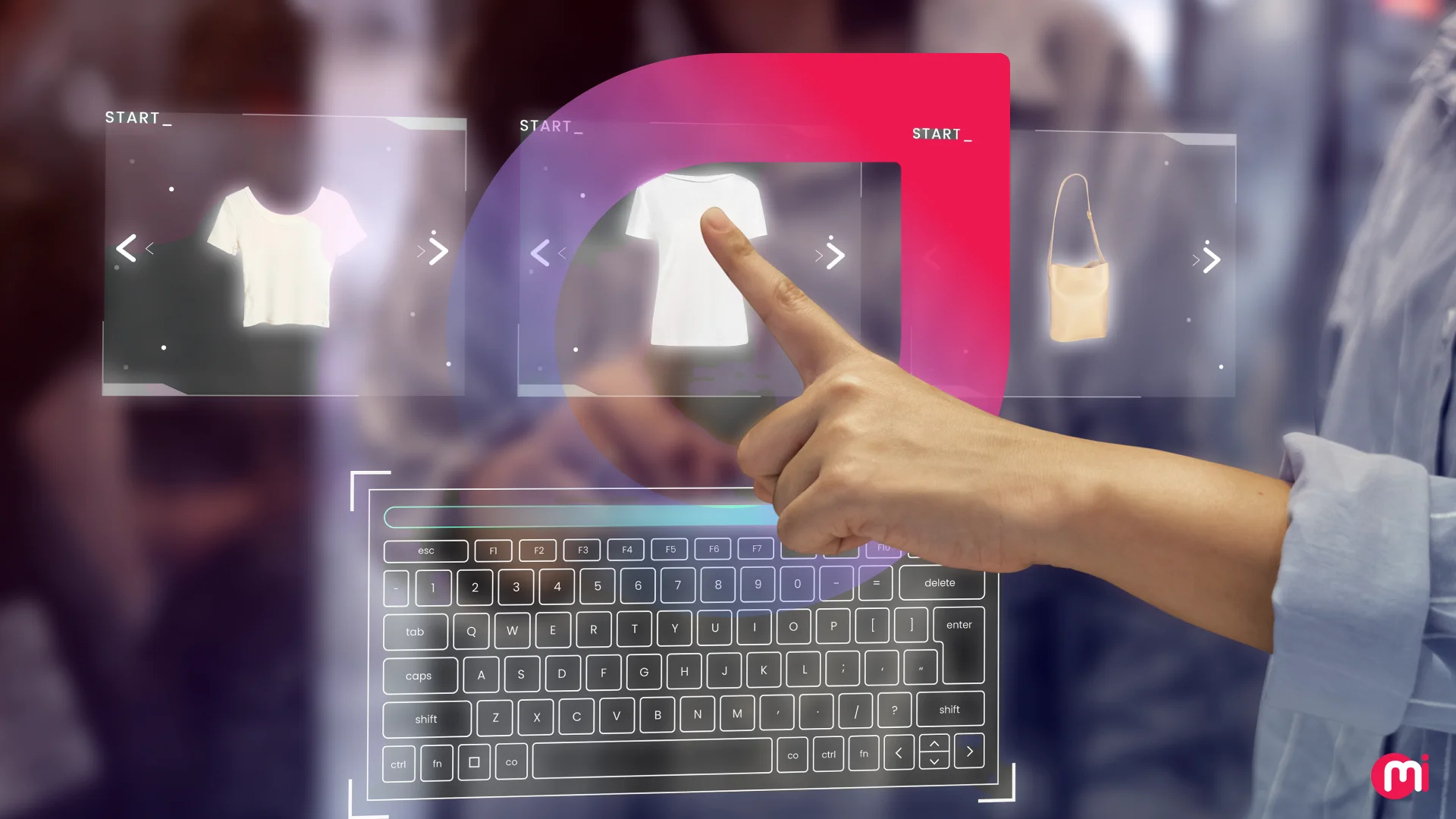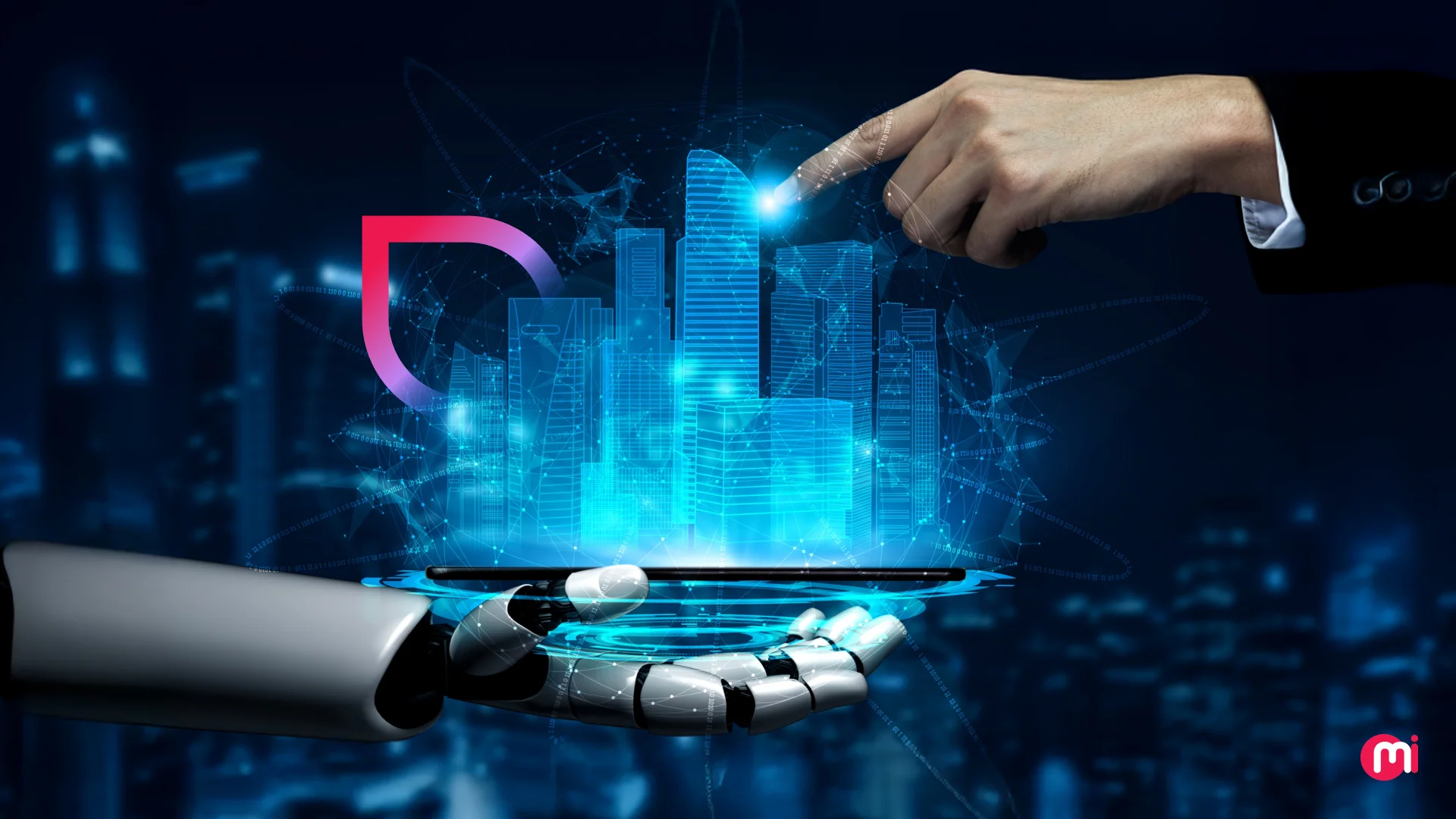AI In Retail: Top Benefits, Use Cases, and Steps to Implement Explained
- AI/ML
- November 4, 2024
With industries embracing AI, there is no doubt that AI in retail industry will also be a widespread reality. However, there is no clear consensus on the impact of artificial intelligence in retail industry operations on consumers and business owners. To address this lack of clarity, we will be exploring how AI has historically been used by industry leaders like Walmart and how they may shape the next generation of retail shopping.
After witnessing the rise of artificial intelligence for multiple use cases, businesses worldwide are closely observing its impact across various industries. One such industry is retail, where significant investments are being made to explore how consumer data, combined with AI, can enhance shopping experiences.
This intensive curiosity has already led retail giants to implement AI-powered recommendation solutions that work by analyzing a consumer’s buying trends.
But how far do the capabilities of AI go in the fast-moving retail world? Let us find out as we explore everything there is to know about AI in retail from its use cases to its progression within the industry.
Planning to equip your Ecommerce platform with AI capabilities? From tech strategy to seamless execution, our CTO-As-A-Service can help!
The Role of AI In Enhancing Retail Shopping Experiences
In the retail industry, the emergence of new technologies is often met with concerns about cost and cohesion with existing processes. But retail store owners do seem enthusiastic about the prospects of having dedicated AI solutions within their stores for their role in process automation.
The areas selected for automation with AI development solutions typically include customer support, product recommendations, inventory management, and data security.
To facilitate this, multiple machine learning algorithms are created to decipher the intent of human text and analyze historical data for tailored recommendations. The most popular AI model types for such applications are natural language processing (NLP) solutions, machine learning solutions, regression AI models, and computer vision development solutions.
Global Statistics for the Usage of AI In Retail Industry
To understand the growth and potential expansion of AI in retail industry, let us explore a few statistics that highlight the proliferation of artificial intelligence:
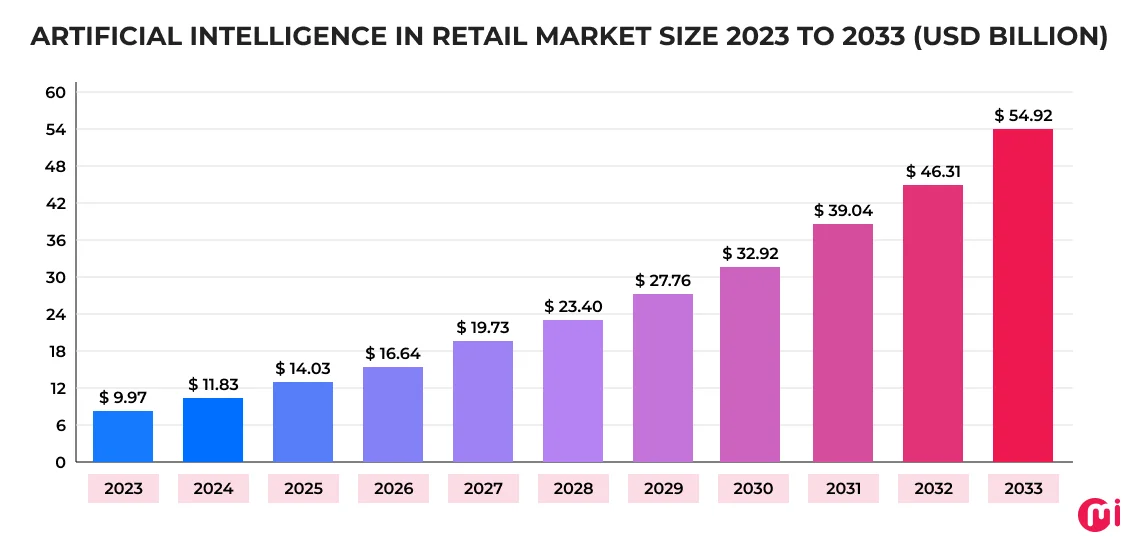
- The market for retail AI solutions is said to grow in value to $54.92 billion by 2033 at an annual CAGR of 18.6% for the forecasting period 2024-2033.
- As per an Infosys survey, 87% of retailers have adopted AI in their operations.
- Another 87% of those who have adopted Gen AI tools in their operations are excited about its positive impact on optimized shopping experiences.
- As per PwC survey, 73% of consumers anticipate using AI-powered chatbots for customer service.
- 60% of consumers are using AI-driven virtual assistants to make online purchases via voice commands, transforming the way they shop.
All of these statistics showcase how AI in retail industry operations is poised to grow within the next few years and which AI solution types will be dominating the market.
What are the Benefits of Implementing AI in Retail Business?
Implementing Artificial Intelligence in retail industry operations is crucial for staying competitive in today’s market. AI enhances various aspects of retail, such as:
- Personalized shopping experience through AI-driven recommendation systems that analyze customer preferences, past purchases, and browsing behavior to provide tailored product suggestions, leading to higher engagement and conversions.
- Efficient inventory management, as there are AI tools that help predict demand more accurately by analyzing trends and customer behavior, helps businesses avoid overstocking or running out of stock.
- Improved customer service by integrating AI-powered chatbots like Replika into your e-commerce platform.
- Dynamic pricing by analyzing market conditions and competitor pricing in real-time, enables retailers to optimize their pricing strategies for maximum profit and competitiveness.
- More profit product mixes as per trends by analyzing upcoming events and festive celebrations to find out products that may come in demand soon.
- Reduced shrinkage by detecting fraud, such as sweethearting or mis-scanning items, and helps manage unsellable inventory, preventing costly losses.
- To spot the next potential retail store location by leveraging AI to run complex simulations using various factors like competitor locations, costs, demographics, and climate, helping them choose optimal store locations.
Moreover, AI solutions for retail can help businesses optimize operations, boost sales, and enhance the overall customer experience, driving growth and efficiency in the long term.

Top 5 Use Cases for AI In Retail Shopping
To best understand how AI makes the retail shopping experience better holistically, we must first know the areas where it is used to strategically enhance ROI. The use cases stated below show the departments where AI solutions for retail hold the most potential for better customer engagement and cost optimization for retail centers.
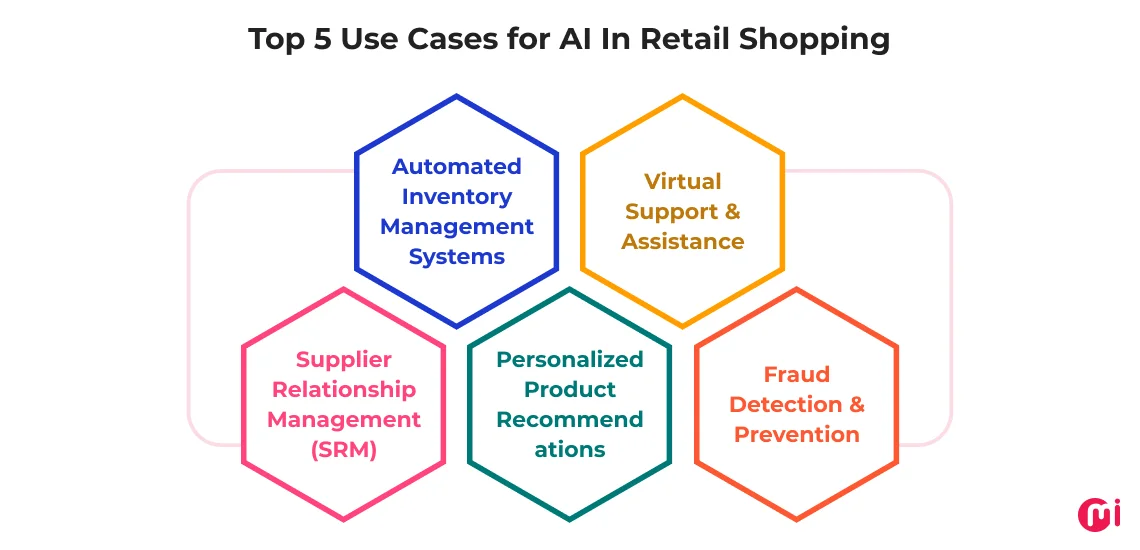
1. Automated Inventory Management Systems
While formulas such as the EOQ (Economic Order Quantity) and MOQ (Minimum Order Quantity) do a good job of helping businesses predict the ideal inventory size for businesses, they are not capable of calculating dynamic variables. These variables include historic sales data and economic conditions.
A predictive AI model addresses this challenge as it is capable of using multiple data sources to calculate these fluctuating variables in real time to predict the optimal inventory levels. For instance, large retail chains can integrate a predictive AI model with a unified sales database from multiple stores and POS systems to analyze buying patterns and volumes.
This allows the model to access live and historical data to make inventory predictions ahead of time. Once a potential case of overstocking or understocking is detected, the model can autonomously notify concerned departments to make data-driven decisions to remedy the situation.
2. Virtual Support & Assistance
One of the best-known use cases for AI within retail is to use generative AI models to fulfill support roles within stores and websites. For popular products, even off-the-shelf AI models such as GPT-4o can be used with an API key to deliver adequate support with product descriptions.
However, the true potential is only unlocked once the generative AI models are given proprietary data to deliver the most relevant advice/suggestions to customers. Using proprietary training data allows niche businesses to provide critical product details such as allergen information and sizing guides 24×7 to any consumer across the globe.
These AI-powered virtual assistants (like we created one for I.AM+) can also adapt according to each consumer data to deliver the most relevant product information which protects the business from liability and returns.
3. Supplier Relationship Management (SRM)
Mundane and repetitive back-office tasks for SRM such as invoicing and supplier monitoring, can be automated and streamlined by using AI process automation systems. These systems can autonomously deploy invoices or notices to suppliers in response to preset triggers for inventory levels or fluctuations in product pricing.
Dedicated AI algorithms can also be used to compare suppliers on their delivery schedules, cost, and product quality to help decision-makers choose the ideal supplier to partner with. Overall, the use of AI in SRM reduces the communication latency between retailers and suppliers while optimizing costs, which gives businesses a tremendous edge in terms of profitability.
4. Personalized Product Recommendations
Retailers are increasingly leveraging big data and AI to offer tailored product recommendations that boost sales. By analyzing order histories and product details, AI models can segment customers into buyer profiles based on their preferences.
Once consumers are categorized, the AI evaluates inventory to suggest relevant products to each profile, ensuring personalized recommendations. These models continually adapt, improving the accuracy of recommendations with each interaction, which keeps customers engaged and enhances their shopping experience.
This personalized approach drives repeat purchases and increases overall sales.
5. Fraud Detection & Prevention
An area of operation that is very resource-intensive for retail businesses is handling fraudulent transactions. This is especially true for e-commerce retailers in the instances of a chargeback or false product returns. Luckily, most of these fraudulent interactions follow similar patterns, which can be recognized by an anomaly detection AI model.
Modern anomaly detection AI models are being readily integrated into checkout pages and payment gateways for this reason and boast real-time transaction monitoring capabilities. With such features, the AI model can preemptively flag suspicious transactions and prompt actions that protect the business from any related losses.
Real-World Examples of AI Being Used By the Retail Industry
On paper, all of these innovations for retail using AI sound impressive, though the true gravity of their transformational effect can be witnessed in real life. To do this, let us look at how large retail giants across the globe are pioneering the usage of AI within their products and services.
1. IKEA Place app
One of the earliest examples of using AI for retail applications can be seen using the IKEA Place app, which was developed to showcase the powers of augmented reality. This technology allowed users to visualize how products from IKEA would look in their area of choice.
Using advanced AI scaling technologies, this app provides true-to-life proportions for a large variety of IKEA products. Such AR technologies inspire more confidence in the customer to make a purchasing decision.
Read More: How AI is Revolutionizing the Agriculture Industry?
2. Walmart’s Festive AI Inventory Management System
With over 4,700 stores to manage, the Walmart conglomerate faced issues in promoting products for festive seasons. For this, they integrated AI solutions into their inventory management systems to dispatch holiday shopping products ahead of time.
The solution also augmented shelving plans to allow for the fastest discovery. This gives customers an immersive shopping experience where they can easily locate the most relevant products.
3. L’oreal ModiFace
The beauty industry of products is notorious for restricting the ability to test products. This is especially true for makeup. L’oreal recognized this limitation and acquired ModiFace which innovated in facial recognition and augmented reality (AR) technologies.
Post-acquisition, L’oreal developed a comprehensive platform that allowed users to test makeup on their faces with their mobile devices. To account for the color science on different sensors, an AI algorithm was used to facilitate highly accurate shade calibration.

Emerging Trends of AI Usage In Retail
As of 2024, there have been significant strides in adopting AI for retail industry operations. Luckily, there are still a lot more emerging trends of AI in the industry, which opens up opportunities for new businesses to innovate and expand their offerings.
Some of these prolific trends are as follows:
AR/VR-Based Shopping Experiences
Being able to visualize products in the real world is a powerful tool to drive more conversions. This ability is exclusive to augmented reality and virtual reality (AR/VR) solutions, which are being rapidly developed to boost customer confidence for purchasing newer products.
Curious to know more about AR/VR applications for e-commerce solutions that retail businesses can benefit from? Our linked blog on it can provide you with valuable insights.
Visual Product Search
For industries such as fast fashion and consumer technology, visual product search features enable instant discovery of products without vague text-based descriptions. These technologies are being implemented in search engines to collectively boost the discoverability of products for multiple brands.
Automated Warehousing
Large corporations such as Amazon and Walmart with massive warehouses, have started investing in autonomous warehousing technologies. These technologies predominantly involve the use of robotic systems to stock and dispatch supplies with the least amount of discrepancies.
Wanna know how we helped Panasonic with the Warehouse Management System? Check out our linked case study for more insights.
Dynamic Pricing
Fast-food giant Wendy’s introduced the concept of surge pricing for their outlets, which made the prices of products change dynamically in accordance with market conditions. This move was met with controversy; however, it does indicate a push to adopt these systems for peak profitability.
There are just a few, but there are also many retail & ecommerce development trends that are revolutionizing the shopping experience.
Factors to Keep in Mind Before Implementing AI for Retail Applications
Given the enthusiasm and large investments into implementing AI in retail applications, it must be stated that the process is prone to encountering complications. These complications usually range from technical limitations to receiving backlashes from consumers. The factors mentioned below are said to be the most common within the industry.
AI Integration Compatibility
Most retail outlets and software solutions are built on legacy infrastructure and application architectures. Integrating an AI solution that has multiple dependencies into such an environment can make it prone to failure from compatibility issues.
The fix to these compatibility issues often lies in extensive solution modernization and a complete infrastructure overhaul to accommodate the processing needs of an AI model. Apart from this, comprehensive data transformation and migration may also be required to retain existing consumer and transactional data.
User Response and Satisfaction
If an AI solution is not received well by the end user, it can make the entire development cycle futile, leading to significant losses. This is why it is important to gauge the AI solution’s interactions with customers before rolling it out into production.
This can be done through the initial proof-of-concept stage of development, where the solution is deployed to select users under a Beta or early-access phase. Doing this also gives you key metrics of AI model accuracy, which can then be used to optimize performance.
Model Hallucinations
A critical measure to take before deploying an AI solution is to test it rigorously to ensure that the AI model does not face any hallucinations. Similar to human hallucinations, AI model hallucinations cause the production of false outputs due to a lack of relevant data.
A single instance of such a hallucination can subject a retailer to great liabilities since the AI model acts as an authority on your behalf. The best way to fix this is by placing measures to deny output to queries that do not fall within the scope of the AI model and placing triggers to redirect such queries to human representatives.
Steps to Successfully Implement AI in Retail Operations
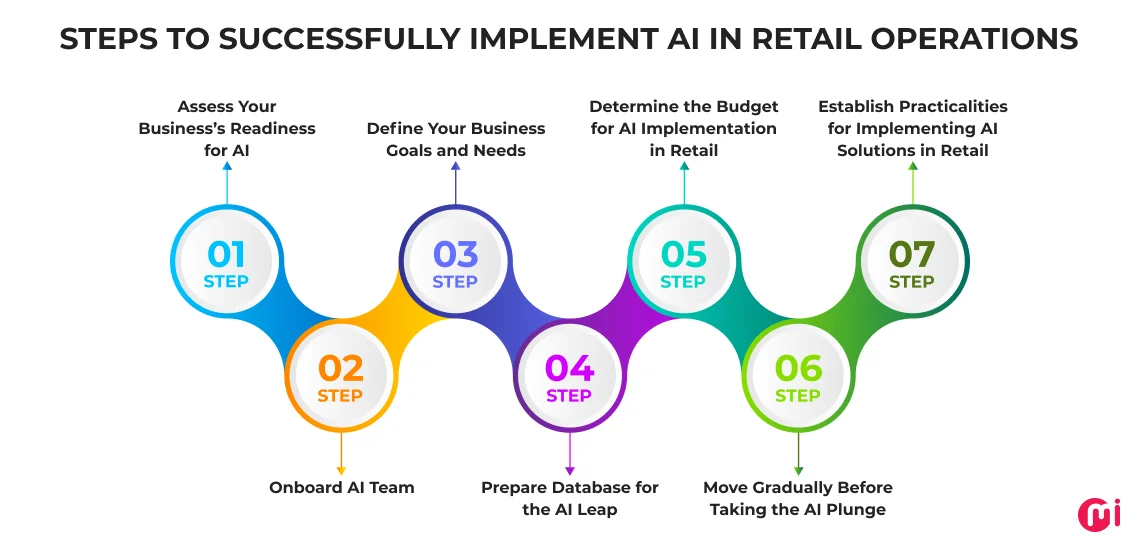
When it comes to implementing AI – be it for retail operations or any other industry’s business operations—it’s not wise to directly jump into full-fledged AI implementation without understanding your current dynamic, goals related to it, and many other things.
Hence, it’s a must to analyze current business IT infrastructure and prepare your retail operations to get ready for the wide-scale AI implementation. Steps include:
STEP 1: Assess Your Business’s Readiness for AI
Evaluate your current infrastructure, technology, and workforce to determine if your retail operations are ready for AI integration. This includes analyzing your digital maturity and understanding how AI can fit into existing processes.
STEP 2: Define Your Business Goals and Needs
Identify the specific business challenges AI will address, whether it’s improving customer experience, optimizing inventory, or enhancing operational efficiency. Clear goals will help guide your AI strategy.
STEP 3: Determine the Budget for AI Implementation in Retail
Set a realistic budget for AI implementation, considering factors like technology, infrastructure, hiring specialists, and ongoing maintenance. It’s crucial to balance investment with expected returns.
STEP 4: Establish Practicalities for Implementing AI Solutions in Retail
Understand that, be it about implementing AI or any other technology – it takes time if planning to get the impactful solution that’s sustainable for the long term. The timeline for the AI implementation can differ as per the change in requirements.
STEP 5: Onboard AI Team
The decision to implement AI into your retail software solution requires assistance from AI experts. This requires you to hire AI developers and hire data scientists with expertise and experience in working on AI-powered retail app development solutions. From strategic tech consultation to custom AI/ML development services, AI experts will guide you to get maximum ROI on your investment.
STEP 6: Prepare Database for the AI Leap
Data is a fuel to AI solutions, and it is even more important in the case of retail. To prepare it for the AI exploration, you have to clean and organize data into a proper database form.
It also asks for setting up a robust database infrastructure capable of handling the large volumes of data AI requires. This may involve upgrading storage solutions or adopting cloud-based platforms for scalability.
STEP 7: Move Gradually Before Taking the AI Plunge
Rushing only complicates things, especially when it comes to AI implementation, where patience is key. AI and ML algorithms require time to train, fine-tune, and gain intelligence. Gradual implementation not only allows these systems to develop properly but also provides the opportunity for adjustments and learning before fully integrating AI across your retail operations.
Want to know the role of AI in digital transformation? Read our linked blog for better insights.
Experience the Transformative Powers of AI in Retail with MindInventory
Regardless of the use cases that you want to utilize AI for, MindInventory is here to help you bring your ideas to life.
For instance, we helped Passio.AI develop an AR and computer vision-based AI solution that allows customers to virtually apply paint to walls. This helps them visualize how a specific paint would look under different room lighting conditions and calculate the exact quantity of paint needed for a wall. Our involvement with Passio improved their image recognition capabilities for their product Paints AI with 95 – 97% of accuracy.
Similarly, MindInventory as a retail software development company, helps businesses expand their operations with the help of autonomous systems. Every facet of the retail industry from managing shipments to handling customer queries, can be handled by the AI solutions built by our team of AI experts.

FAQ About AI in Retail
AI technologies offer a multi-faced approach to reducing costs by optimizing all areas of a retail business. However, the main cost reductions with AI are seen in areas such as inventory optimization, customer service automation, supply chain optimization, dynamic pricing, and fraud detection as they directly reduce costs and losses.
Yes. By making the shopping experience tailored to each user, an AI-powered recommendation model can continuously suggest new products to existing users. These automated suggestions not only keep each customer connected to your brand but also make the chances of additional sales higher.
Currently, the types of AI solutions that predominantly drive transformational change in the retail industry include support chatbots, automatic checkout solutions, custom recommendation engines, Augmented Reality (AR), and sales forecasting.
The main challenges of implementing an AI solution for the retail industry lie in the quality of data used and integration within existing systems. Refining data from a retail database takes a lot of time and effort in terms of formatting and adaptation. Meanwhile, integration with existing systems requires the use of multiple APIs or complete modernization of legacy applications.
Computer vision & OCR, natural language processing (NLP), machine learning (ML), and recommendation engines are powering retail operations.
